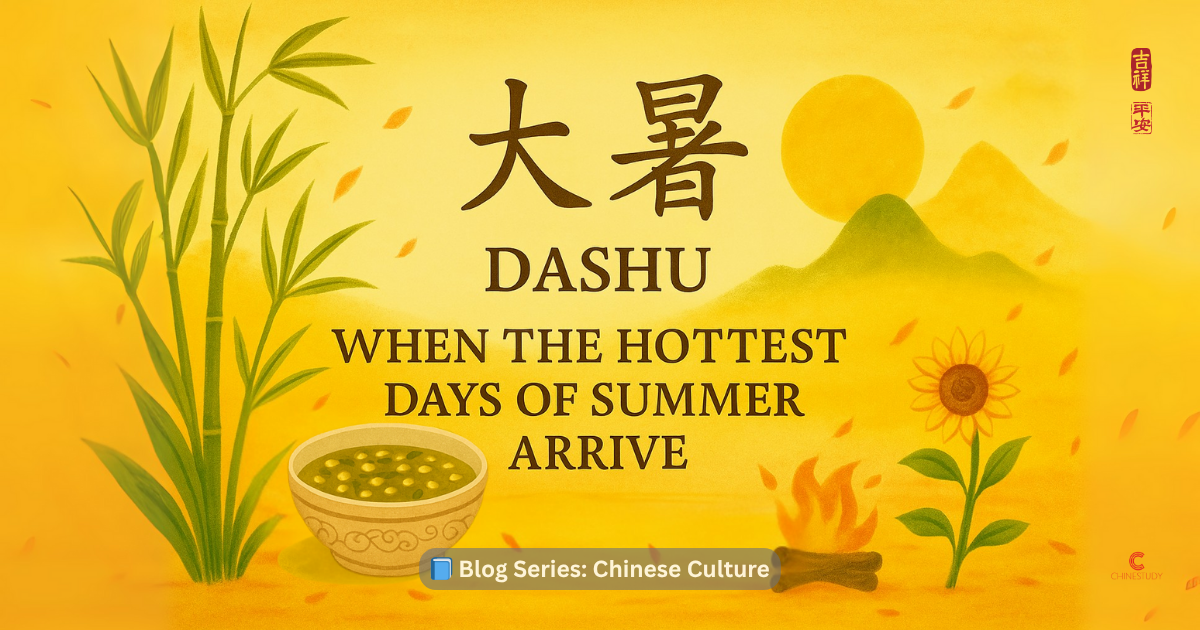🔥 大暑 Dàshǔ – When Summer Reaches Its Peak

大暑 (Dàshǔ) is the 12th solar term in the Chinese calendar.
It usually falls around July 22–24 and marks the hottest, most intense part of summer in China.
🌡️ After Xiǎoshǔ (Minor Heat) comes Dàshǔ (Major Heat).
During this period:
- ☀️ The sun is fierce, and temperatures soar.
- 🌧️ It’s often humid, with thunderstorms or typhoons.
- 🌾 Crops grow quickly, but so does the risk of heatstroke.
It’s a time when nature is full of energy — but people need to protect their health.
☀️ What Does It Mean?
The name itself tells you everything:
- 大 (dà) = big, major
- 暑 (shǔ) = heat
Dàshǔ = Major Heat — the extreme days of summer.
🥢 How People Celebrate
During 大暑 (Dàshǔ), people focus on cooling down and staying safe from the extreme heat.
In different parts of China, people have these habits:
- Eat cooling foods: watermelon 🍉, mung bean soup, bitter melon
- Drink herbal teas: 凉茶 (liáng chá) to clear heat
- Avoid overwork and sun exposure
🗣 Key Vocabulary & Expressions
- 大暑 (Dàshǔ) – Major Heat
- 酷热 (kùrè) – Scorching hot
- 清热解暑 (qīngrè jiěshǔ) – Clear heat and relieve summer discomfort
- 防暑降温 (fángshǔ jiàngwēn) – Prevent heatstroke and cool down
- 凉茶 (liángchá) – Herbal cooling tea
💬 Try This!
Translate and read aloud:
我们在大暑的时候要注意防暑,多喝水,多休息。
(Wǒmen zài Dàshǔ de shíhou yào zhùyì fángshǔ, duō hē shuǐ, duō xiūxi.)
→ During Dàshǔ, we should watch out for heatstroke, drink more water, and rest more.
🇨🇳 Cultural Insight
大暑 (Dàshǔ) isn’t just about suffering through the heat. It reflects the cycle of extremes in nature.
When something reaches its peak — whether it’s temperature, energy, or effort — the next phase is usually cooling down or slowing down.
That’s why this term reminds us:
- To pace ourselves
- To prepare for the season ahead
- To balance extremes with calm
🌿 In Chinese thinking, heat invites coolness, and effort invites rest.
🌟 Final Thoughts
大暑 (Dàshǔ) teaches us to listen to nature:
☀️ At the peak of heat, prepare for change.
🧊 Cooling down isn’t weakness — it’s wisdom.
🌿 Balance is key in every season.
🇨🇳 Curious about more Chinese traditions?
📚 Step into the blog series: Chinese Culture!
Thank you for subscribing!
Have a great day!